
Energy Materials
Scope & Guideline
Advancing the Future of Sustainable Energy Solutions.
Introduction
Aims and Scopes
- Energy Storage Materials:
Research on materials for various energy storage systems, including lithium-ion, sodium-ion, and zinc-ion batteries, emphasizing performance, safety, and longevity. - Electrocatalysis:
Development of advanced electrocatalysts for energy conversion processes, particularly in fuel cells and electrolyzers, focusing on improving efficiency and reducing reliance on precious metals. - Photovoltaics:
Investigation of materials for solar energy conversion, including perovskite solar cells and organic photovoltaics, aimed at enhancing efficiency and stability. - Sustainable and Green Materials:
Exploration of environmentally friendly materials and recycling methods for energy storage systems, including the use of waste materials and bio-derived components. - Nanostructured Materials:
Application of nanotechnology in energy materials, focusing on the design and synthesis of nanostructures to improve electrochemical performance and energy density. - Interface Engineering:
Study of interfaces in batteries and fuel cells, aiming to optimize interactions between electrodes and electrolytes for enhanced performance.
Trending and Emerging
- Solid-State Batteries:
There is a notable increase in research focused on solid-state battery technologies, emphasizing the development of solid electrolytes and interfaces to enhance safety and performance. - 2D and MXene Materials:
The application of two-dimensional materials, particularly MXenes, is gaining momentum due to their unique properties and potential in various energy applications, including batteries and catalysis. - Recycling and Sustainable Practices:
Emerging interest in recycling spent battery materials and sustainable practices in energy storage highlights the journal's commitment to environmental stewardship. - Advanced Electrode Materials:
Research on novel electrode materials, including alloy-based and composite structures, is rapidly increasing, aiming to improve energy density and cycling stability. - Artificial Intelligence in Materials Design:
The integration of machine learning and AI techniques for the design and discovery of new energy materials is an emerging trend, reflecting the growing intersection of computational tools and materials science.
Declining or Waning
- Conventional Lithium-Ion Battery Technologies:
Research focusing on traditional lithium-ion battery materials and configurations has decreased as the field shifts towards alternative battery technologies such as sodium-ion and potassium-ion systems. - Basic Electrochemistry:
Basic studies of electrochemical processes, while still relevant, appear less frequently as the focus has moved towards application-driven research and advanced materials. - Metal-Organic Frameworks (MOFs):
Although initially a hot topic, the specific applications of MOFs in energy materials seem to be declining as researchers explore more practical and scalable alternatives for energy storage and conversion.
Similar Journals
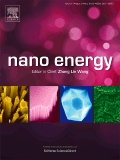
Nano Energy
Empowering Sustainable Futures through NanotechnologyNano Energy is a premier journal published by Elsevier, focused on the dynamic intersection of nano-technology and energy solutions. Since its inception in 2012, this high-impact journal has made significant strides in advancing research across multiple disciplines, showcasing groundbreaking studies in Electrical and Electronic Engineering, Materials Science, and Renewable Energy. With an impressive Impact Factor that places it in the Q1 category of these fields—including a distinguished rank of #6 in Electrical Engineering and #9 in Renewable Energy on Scopus—the journal serves as a vital resource for academics and practitioners alike. Nano Energy aims to disseminate innovative research and developments that contribute to the sustainable energy landscape, thereby addressing pressing global energy challenges. Researchers and professionals seeking to stay at the forefront of nanotechnology applications in energy generation and efficiency will find this journal an indispensable platform for sharing knowledge and driving impact.

Solar RRL
Leading the charge in solar energy advancements.Solar RRL, published by WILEY-V C H VERLAG GMBH in Germany, is a premier journal dedicated to advancing the field of solar energy research and technologies. With an impressive Q1 ranking across key disciplines—including Atomic and Molecular Physics, Electrical and Electronic Engineering, and Energy Engineering—this journal stands out as an authoritative source of high-impact research. Since its inception in 2017, Solar RRL has provided a platform for the dissemination of innovative ideas and findings, making vital contributions to the understanding of solar energy conversion, efficiency improvements, and sustainable technology. Researchers, professionals, and students seeking to stay at the forefront of solar energy advancements will find invaluable insights and rigorous studies in its pages. Although currently not an open-access journal, Solar RRL offers a subscription model that gives readers access to cutting-edge research that shapes the future of energy technology.
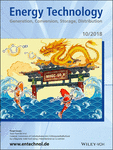
Energy Technology
Advancing the Future of Energy InnovationEnergy Technology, published by Wiley-VCH Verlag GmbH, is a prominent peer-reviewed journal dedicated to advancing the field of energy research and technology. With an ISSN of 2194-4288 and an E-ISSN of 2194-4296, this journal has made a significant impact in the energy sector, holding a Q2 category ranking in the Energy (miscellaneous) category for 2023, and proudly positioned in the 77th percentile within the Scopus ranking for General Energy. Since its inception in 2013, Energy Technology has consistently published cutting-edge research, innovations, and reviews that cater to a wide array of topics including renewable energy, sustainable technologies, and energy efficiency. The journal does not offer open access, yet it remains a key resource for researchers, professionals, and students who are committed to exploring the dynamic field of energy. The journal's efforts to disseminate rigorous scholarship make it an invaluable asset for anyone looking to contribute to or understand the future of energy-related technologies until 2024.
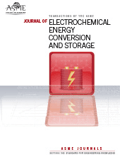
Journal of Electrochemical Energy Conversion and Storage
Innovating Electrochemical FrontiersThe Journal of Electrochemical Energy Conversion and Storage, published by ASME, is a premier platform for cutting-edge research in the fields of electrochemistry, energy engineering, and materials science. With an ISSN of 2381-6872 and an E-ISSN of 2381-6910, this journal aims to disseminate high-quality articles that contribute to the understanding and application of energy conversion and storage technologies. Notably recognized in the 2023 Category Quartiles as Q2 in multiple categories including Electronic, Optical and Magnetic Materials, Energy Engineering and Power Technology, and Mechanical Engineering, it reflects a strong academic impact within its field. The journal also boasts competitive Scopus rankings, highlighting its relevance and influence across disciplines. Operating under an open access model, the journal ensures that research findings are widely accessible, fostering collaboration and innovation among researchers, professionals, and students globally. As we move toward a more sustainable future, the Journal of Electrochemical Energy Conversion and Storage plays a critical role in advancing technologies that promise to reshape how we harness and utilize energy.
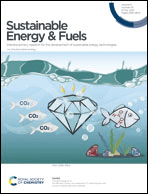
Sustainable Energy & Fuels
Leading the Charge in Sustainable Energy ResearchSustainable Energy & Fuels is a leading journal published by the Royal Society of Chemistry, dedicated to advancing knowledge in the fields of energy engineering, fuel technology, and renewable energy solutions. With its ISSN of 2398-4902 and notable Q1 status in both Energy Engineering and Power Technology as well as Fuel Technology, this journal ranks impressively in the Scopus database, ensuring a strong platform for disseminating impactful research. The journal spans a comprehensive scope aimed at addressing the global challenges of sustainable energy, including innovative methodologies and technologies that promote environmental sustainability. Although it operates under a traditional access model, the journal is committed to providing high-quality content that engages researchers, professionals, and students alike. With significant contributions expected through 2024, Sustainable Energy & Fuels stands at the forefront of facilitating scholarly communication, inspiring advancements in energy technologies that align with sustainability goals.

Journal of Power Sources Advances
Fostering a Community of Energy InnovatorsJournal of Power Sources Advances, published by ELSEVIER, stands at the forefront of innovative research within the fields of Electrochemistry, Energy Engineering and Power Technology, and Materials Chemistry. Having established itself as an Open Access journal since 2020, it aims to disseminate knowledge rapidly and widely among researchers, professionals, and students interested in the latest advancements in power sources technology. With an impressive impact factor and recognition as a Q1 journal in 2023 across multiple categories, it addresses key challenges and innovations in energy generation, storage, and materials development. The journal's commitment to high-quality, peer-reviewed content fosters a vibrant community for discussing breakthroughs that hold the potential to transform energy systems globally. The journal operates out of the Netherlands, enhancing its global outreach, while its strong Scopus rankings highlight its influential role in driving research within its scope. Journal of Power Sources Advances is the pivotal resource for those dedicated to shaping the future of energy sustainability and technology.
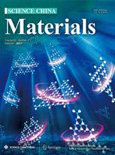
Science China-Materials
Pioneering Research for a Sustainable Tomorrow.Science China-Materials is an esteemed peer-reviewed journal dedicated to advancing the field of materials science, published by SCIENCE PRESS. With a strong focus on innovative research and applications, this journal provides an essential platform for disseminating groundbreaking findings in materials development, characterization, and engineering. Since its inception, Science China-Materials has achieved an impressive Q1 ranking in the Materials Science (miscellaneous) category, reflecting its commitment to quality and the impact of its publications, as indicated by its 86th percentile ranking in Scopus. The journal is set to converge its contributions from 2016 to 2024, making it a vital resource for researchers and professionals interested in the latest advancements and trends in materials science. As an open access publication, it ensures that knowledge is freely available to a global audience, promoting collaboration and innovation across disciplines. The journal is headquartered in Beijing, China, and continues to attract high-quality submissions from leading experts in the field.

Energy & Environmental Materials
Empowering a Greener Future with Innovative DiscoveriesEnergy & Environmental Materials, published by WILEY, is an esteemed academic journal dedicated to pioneering research in the multifaceted domains of energy, environmental science, and materials science. Since its inception in 2018, this journal has rapidly established itself as a leading platform, holding a prestigious Q1 ranking across multiple categories including Renewable Energy, Sustainability, and Waste Management, reflecting its significant contributions to advancing knowledge in these critical areas. With a robust Scopus ranking that positions it in the top percentile for Environmental Science and Materials Science, it caters to a diverse audience of researchers, professionals, and students seeking cutting-edge findings and practical applications in energy efficiency and sustainable materials. This open-access journal facilitates the dissemination of innovative research and aims to bridge the gap between scientific exploration and real-world solutions for a sustainable future. The editorial team encourages submissions that explore both theoretical and practical aspects, ensuring that every publication not only contributes to the academic landscape but also drives impactful change in energy and environmental practices.

Joule
Exploring New Frontiers in Energy ScienceJoule, published by CELL PRESS, is a premier journal dedicated to the rapidly evolving field of energy research. Since its inception in 2017, Joule has established itself as a leading source of high-impact studies in energy, achieving an outstanding Q1 ranking in the Energy (miscellaneous) category and ranking #1 out of 73 in the general energy field, placing it within the 99th percentile according to Scopus metrics. The journal aims to advance the understanding of diverse energy forms and their applications, providing a platform for significant breakthroughs that can drive sustainable practices and innovative technologies. Through rigorous peer review and expert contributions, Joule serves as an invaluable resource for researchers, professionals, and students engaged in tackling some of the most pressing energy challenges of our time. Based in the United States, Joule continues to foster collaboration and interdisciplinary approaches in energy research, striving to illuminate pathways toward a sustainable future.
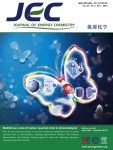
Journal of Energy Chemistry
Transforming Energy Research for a Sustainable TomorrowThe Journal of Energy Chemistry, published by Elsevier, is a premier international journal that has established itself at the forefront of research in the fields of electrochemistry and energy technology. With an impressive impact factor, this journal is classified in the Q1 quartile across multiple categories including Energy Engineering and Power Technology, Fuel Technology, and Electrochemistry, underscoring its significant contribution to advancing knowledge and innovation in energy systems. Based in the Netherlands, the journal offers open access to its cutting-edge research, allowing for broad dissemination and engagement among researchers, professionals, and students alike. The scope of the journal spans crucial topics from chemical energy storage to sustainable energy solutions, making it an essential resource for those looking to understand and contribute to the evolving landscape of energy chemistry.